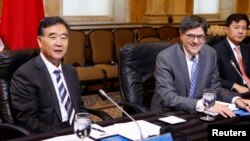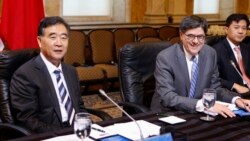“Major economies like [the United States’ and China’s] are consistently challenged to reform and adapt and to strengthen our institutions,” U.S. Secretary of Treasury Jacob Lew said at the fifth round of the U.S.-China Strategic and Economic Dialogue held recently in Washington D.C. “We know this from our own experience recovering from the financial crisis, and [China] know[s] this from [its] ongoing transition to the next stage of [its]economic development.”
“We welcome the market-oriented reform commitments [China has] made,” Secretary Lew said. “These reforms recognize the imperative of shifting to domestic consumption, greater private sector innovation, an economy that’s more open to competition with more flexible prices, including the exchange rate and interest rates, and a more efficient financial system.”
“We each must guide our economic futures by expanding the middle class of our nations,” Secretary Lew emphasized. “What matters is ensuring that our economies are growing in a way that is balanced, beneficial, and mutually compatible.”
“As the world’s two largest economies, too much is at stake for us to let our differences come in the way of progress,” Secretary Lew continued. “For the United States, this means an economic relationship where our firms and workers operate on a level playing field and where the rights of those who participate in the global economy, including innovators and the holders of intellectual property, are preserved and protected from government-sponsored cyber intrusion. It means working together to address our common challenges, such as climate change, energy and food security, and conduct in cyberspace. Cooperation on these fronts is absolutely critical to our own futures and the world’s as well.”
“We want China to succeed in implementing [economic] reforms because a prosperous China is not only good for China, but it’s good for the United States and for the whole world,” Secretary Lew said in conclusion. “While today’s commitments do not resolve all of the concerns of either side, they do represent real progress, progress that will create new opportunities for U.S. workers and companies in an expanding Chinese market.”
“We welcome the market-oriented reform commitments [China has] made,” Secretary Lew said. “These reforms recognize the imperative of shifting to domestic consumption, greater private sector innovation, an economy that’s more open to competition with more flexible prices, including the exchange rate and interest rates, and a more efficient financial system.”
“We each must guide our economic futures by expanding the middle class of our nations,” Secretary Lew emphasized. “What matters is ensuring that our economies are growing in a way that is balanced, beneficial, and mutually compatible.”
“As the world’s two largest economies, too much is at stake for us to let our differences come in the way of progress,” Secretary Lew continued. “For the United States, this means an economic relationship where our firms and workers operate on a level playing field and where the rights of those who participate in the global economy, including innovators and the holders of intellectual property, are preserved and protected from government-sponsored cyber intrusion. It means working together to address our common challenges, such as climate change, energy and food security, and conduct in cyberspace. Cooperation on these fronts is absolutely critical to our own futures and the world’s as well.”
“We want China to succeed in implementing [economic] reforms because a prosperous China is not only good for China, but it’s good for the United States and for the whole world,” Secretary Lew said in conclusion. “While today’s commitments do not resolve all of the concerns of either side, they do represent real progress, progress that will create new opportunities for U.S. workers and companies in an expanding Chinese market.”






